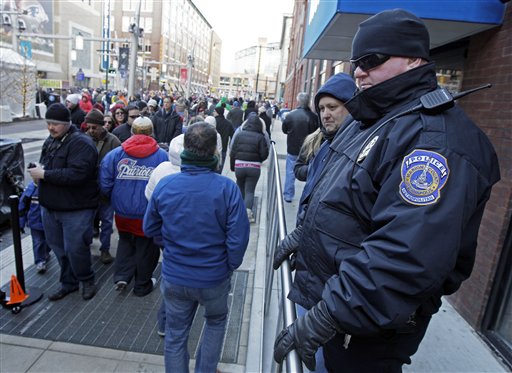INDIANAPOLIS — From pickpockets and prostitutes to dirty bombs and exploding manhole covers, authorities are bracing for whatever threat the first Super Bowl in downtown Indianapolis might bring.
Some — nuclear terrorism, for instance — are likely to remain just hypothetical. But others, like thieves and wayward manhole covers, are all too real.
Though Indianapolis has ample experience hosting large sporting events — the Indianapolis 500 attracts more than 200,000 fans each year, and the NCAA’s men’s Final Four basketball tournament has been held here six times since 1980— the city’s first Super Bowl poses some unique challenges.
Unlike the Final Four, which is compressed into a weekend, the Super Bowl offers crowd, travel and other logistical challenges over 10 days leading up to the Feb. 5 game. And unlike the 500, where events are largely concentrated at the Indianapolis Motor Speedway about seven miles from Lucas Oil Stadium, the NFL’s showcase event will consume 44 blocks — about a mile square — in the heart of the city, closing off streets and forcing an anticipated 150,000 or more NFL fans to jockey with downtown workers for space much of the week.
“This is clearly bigger in terms of the amount of people who will be downtown over an extended period of time,” city Public Safety Director Frank Straub said.
Under a security risk rating system used by the federal government, the Super Bowl ranks just below national security events involving the president and the Secret Service, said Indianapolis Chief of Homeland Security Gary Coons. The ratings are based on factors including international attention, media coverage, number of people the event attracts and visits by celebrities and foreign dignitaries, he said. The Indianapolis 500 ranks two levels below the Super Bowl.
The city has invested millions of dollars and worked with local, state and federal agencies to try to keep all those people safe. Up to 1,000 city police officers will be in the stadium and on the street, carrying smartphones and other electronic hand-held devices that will enable them to feed photos and video to a new state-of-the-art operations center on the city’s east side or to cruisers driven by officers providing backup, Straub said. Hundreds of officers from other agencies, including the state police and the FBI, will be scanning the crowd for signs of pickpocketing, prostitution or other trouble.
One concern has been a series of explosions in Indianapolis Power & Light’s underground network of utility cables. A dozen underground explosions have occurred since 2005, sending manhole covers flying.
Eight explosions have occurred since 2010. The latest, on Nov. 19, turned a manhole cover into a projectile that heavily damaged a parked car and raised concerns about the safety of Super Bowl visitors walking on streets and soaring above the Super Bowl village on four zip lines installed for the festivities.
Since December, IPL has spent about $180,000 to install 150 new locking manhole covers, primarily in the Super Bowl village and other areas expected to see high pre-game traffic.
IPL officials say the new Swiveloc manhole covers can be locked for security reasons during the Super Bowl. In case of an explosion, the covers lift a couple of inches off the ground — enough to vent gas out without feeding in oxygen to make an explosion bigger — before falling back into place.
An Atlanta consultant hired by the Indiana Utility Regulatory Commission last summer to audit IPL’s underground network of cables for a cause of the explosions says the new covers are merely a Band-Aid.
“We’ve argued it’s better to prevent,” said Dan O’Neill of O’Neill Management Consulting, which filed its report in December.
O’Neill’s team couldn’t pinpoint an exact cause for the explosions but said a flawed inspection process contributed, noting that IPL workers missed warning signs such as road salt corroding an old cable or leaks in nearby steam pipes. In a report filed Jan. 19 with Indiana utility regulators, the power company said it had overhauled its inspection process.
IPL will dispatch extra crews to the area around the stadium in case of power-related problems, such as a recent breaker fire that left 10,000 customers in homes south of downtown without power. Spokeswoman Crystal Livers-Powers said the company doesn’t anticipate any power issues.
Straub, the public safety director, said he’s confident the city is prepared and notes that Indianapolis hosts major events “pretty regularly.”
Special teams from the Department of Energy will sweep Lucas Oil Stadium and the surrounding area for nuclear terror threats, and a new $18 million high-tech communications center that opened in time for the lead-up to the game will tie it all together.
“We’re using more technology, and state of the art technology, than has been used in any Super Bowl before this one,” Straub said.
Send questions/comments to the editors.


